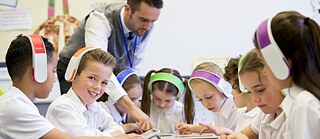Teacher Training Podcasts
Learning on the Go with Podcasts in Your Pocket
Can we learn new things on the go, whilst going for a walk, exercising or doing household chores? Yes, with podcasts!

Can we learn new things on the go, whilst going for a walk, exercising or doing household chores? Yes, with podcasts!

“Too complicated”, “too much lost time” or “I don’t have any control over what my pupils are doing there” – this is how some teachers spontaneously react to the idea of using task-based language learning in a digital context.

Last year, teacher Hendrik Haverkamp explained in DIE ZEIT how ChatGPT is transforming teaching. What has happened since then? A discussion about the time-saving benefits of artificial intelligence and how it may spell the end of homework.

With a lively mix of personal stories, podcasts, learning material, entertaining games and useful information, this web portal provides helpful information about living and working in Germany, including important information about how to contact administrative offices and counselling services. It also features plenty of German-learning exercises for levels A1 through B2.

“For us teachers, teaching online means full concentration from the first to the last minute. It’s even more strenuous than in-person teaching!” How has the everyday work of teachers changed in the wake of the pandemic? Three Goethe-Institut teachers report their experiences.

Using conferencing tools as a synchronous online element in blended or online learning is now an integral part of the portfolios of Goethe-Instituts and other language schools. These tools can be a sustainable approach to group learning – provided they are used in certain ways, as presented in the following practical tips.

The Goethe-Institut's "My Way to Germany" web portal provides German language exercises as well as useful information about living and working in Germany. We show four ways in which teachers of German as a foreign language can use the collection of materials for their teaching and independent learning.

In a praxis-oriented research project, a self-learning program is trained to give automated feedback on open writing tasks performed by German language learners. It is not aimed at replacing teachers, but at making their work more efficient and allowing for a more personalized approach to learning a foreign language.

Teaching online poses a number of new challenges for teachers. Teachers feel they have to be careful about correcting mistakes for fear of discouraging, or even losing learners in the new medium. But do you really have to correct mistakes at all? If so, how can you do it without causing frustration?

The consequences of the pandemic pose an unprecedented challenge to education systems all over the world. Teachers and students have been particularly hard hit in the US, where the virus continues to spread unabated. The upcoming reorganization of the schools there will radically change teaching in America.

How do you teach a foreign language effectively online? What are the challenges involved in “all-digital” learning? Here are the latest research findings on the subject of e-learning. Digital tools are needed in traditional language instructions, but now language teaching has gone completely virtual.

How will we be learning foreign languages in 50 or 100 years’ time? What role will be played by digital media in the foreign language lessons of the future? And is it in fact possible to give meaningful answers to these questions today?
